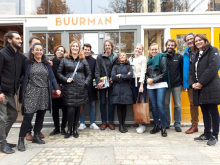Granada
Granada is a city and the capital of the province of Granada, in the Andalusia region of Spain. The population of the city of Granada is 237,540, with the University of Granada having about 60,000 students spread over five different campuses in the city.
The city of Granada has a high rate of students, with a high potential of knowledge and creativity that can be attracted to develop a business in the city, but its indigenous young population is shrinking. The urban area is characterized by low/no industrial land but a tourist and cultural heritage. The historical centre is in the process of revaluation and has spaces that can be re-modelled and reused for economic activities for culture, leisure, tourism and technological development.
- Population decline. Between 2001 and 2011 the population fell by - 2.0 %44. According to the Spanish National Statistics Institute45 Granada will experience further shrinkage of 0.66% in the period 2013-2022. Analysing the population pyramid of the city of Granada, one its main demographic characteristics is of an aging population, with 19.76% of the population being over 65 years of which 60.72% are women.
- Aging population.13.71% of the total population are classed as young people. However, with birth rates being very low (at 17.5 %) and the aging population of Granada at 19.8% (well above the Andalusian level of 15.9 % and the Spanish level of 18.2 %) this data is indicative of the need to promote policies to retain and increase young people.
- Deprivation. Andalusia was one of the hardest hit regions of Spain in terms of job destruction since the start of the crisis, averaging 35% in 2012 (37% for women and 65% for people under 25).
- Low ‘tech’ business start-up rates. In 2007, just before the economic downturn 1,064 companies were created in the City of Granada, with this number decreasing to less than half and half for two years later. 88% of these new companies are in the services sector, while 8% are in construction, and only 3% and 1% in industrial and agriculture respectively. In this regard, Granada is similar to the rest of the Spanish state, but it is particularly burdensome for the fragility and fragmentation of its productive fabric.
- Urban Degradation. Degradation of buildings in the city centre and high cost of rehabilitation are causing urban degradation in the historical city centre.
- Fragmentation of initiatives. The loss of the competencies of the City on issues such as employment and local development policies that does not allow an effective local urban economic renew, lack of coordination and competences compared to other administrations (regional and central). Existence of isolated initiatives often without involving all actors in the area.
- Over reliance on the services sector. If the contribution of the different productive sectors is analyzed Granada both employment and the number of companies, the service sector is the most important with 84.61 % of the 22,363 total establishments in this sector, employing 83% of workers. The second largest sector by employee numbers is the construction sector with 8% of the contracts, occupying well almost 8 % of the weight in the number of companies.
- Micro firm economy. Corporate concentration shows that 99.6 % of companies have staff of less than 50 people In Granada the sole proprietorship is very represented by freelancers. It is not surprising that by tradition Granada University expect a Union that Professional brings together more than 25 professional associations representing close 60,000 workers. By 2013, only 3 Grenadines firms can be found in the top 500the most important companies in the nation. Only five Grenadines companies have a turnover of over 100 million Euros.
SOME RELATED NETWORKS
Gen-Y City
URGE
Article
23 Action Planning Networks ready for Phase 2!
Article
Transition to circular economy: the ‘’power’’ of the building sector towards better cities
News





